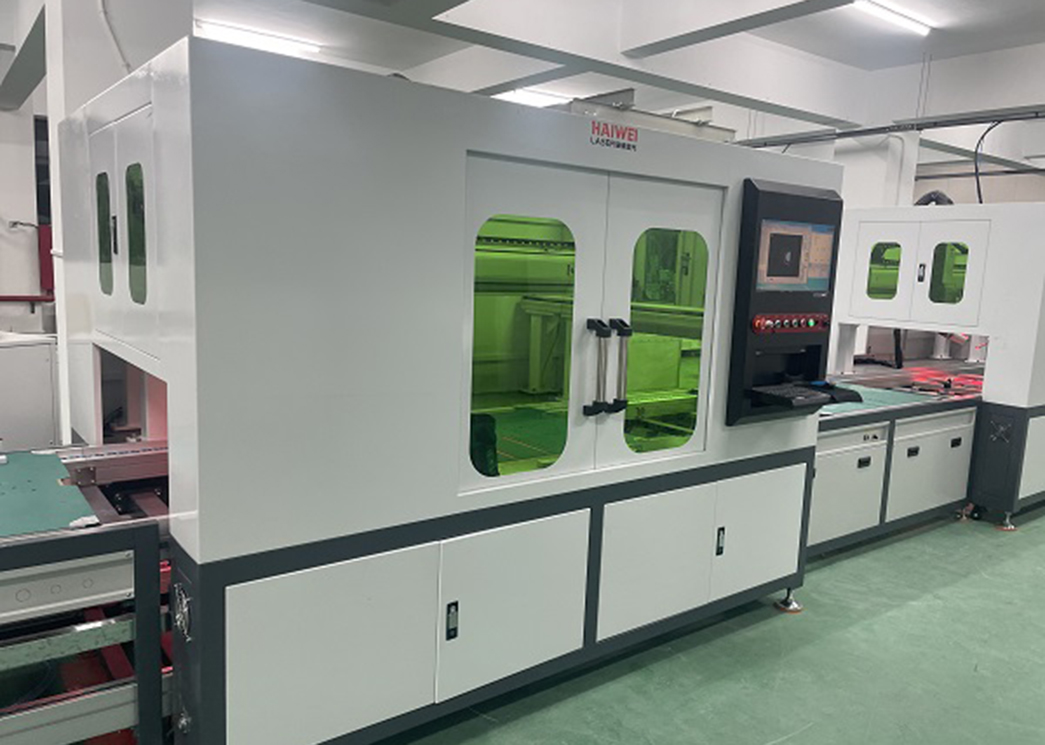What are the advantages of laser welding machines in lithium battery pack production lines?
In the lithium battery pack production line, welding process is an important link that determines the performance and safety of the battery pack. With the advancement of technology, laser welding machines have gradually replaced traditional welding methods and become the preferred choice in the industry. Next, Haiwei Laser will explore the advantages of lithium battery laser welding machines from several key aspects and help you understand why it can meet the needs of modern production.

Lithium battery laser welding machine
High precision welding improves product quality
High precision welding
The manufacturing of lithium battery packs requires extremely high welding accuracy, especially when connecting the junctions between cells and between cells and busbars. Traditional welding methods often struggle to achieve ideal precision and are prone to problems such as virtual welding or over welding. The lithium battery laser welding machine can achieve precise control at the micrometer level, ensuring that each welding point is firm and reliable. This high precision not only improves the overall performance of the product, but also reduces safety hazards caused by welding defects.
Adapt to various material requirements
Multi material adaptability
Lithium battery packs are typically composed of different types of materials, such as copper, aluminum, and their alloys. Each material has different requirements for welding processes. The lithium battery laser welding machine, with its flexible parameter adjustment ability, can adapt to the welding needs of various materials. For example, when welding aluminum components, laser welding can ensure the quality and aesthetics of the weld seam by adjusting the laser power and pulse width. In addition, laser welding can also provide effective solutions for some new materials, ensuring welding quality without affecting material properties.
Lithium battery laser welding machine
Improve production efficiency and consistency
efficient production
A highly automated lithium battery laser welding machine can significantly improve production efficiency. They are usually equipped with automatic loading and unloading systems, weld seam tracking systems, and intelligent control systems, which can achieve continuous and fast welding operations. Especially in large-scale production scenarios, such as the manufacturing of electric vehicle battery packs, laser welding machines can significantly improve production speed while ensuring consistent welding quality for each product. This not only shortens the production cycle, but also reduces labor costs, bringing higher economic benefits to the enterprise.
Safety and environmental considerations
Operational safety and environmental protection
The laser welding process of lithium batteries is relatively enclosed, producing less smoke and harmful gases, which is beneficial for improving the working environment and protecting the health of operators. Compared to traditional welding methods, laser welding requires lower energy consumption, which helps to reduce operating costs and carbon emissions for businesses. These characteristics make laser welding a more environmentally friendly choice, in line with the current trend of green manufacturing. To further ensure safety, the equipment should be equipped with multiple safety mechanisms, such as emergency stop buttons and automatic detection systems, to prevent accidents from occurring.
COST-BENEFIT ANALYSIS
Long term cost savings
Although the initial investment cost of lithium battery laser welding machine is relatively high, in the long run, its efficient and high-quality welding can bring significant cost savings. Firstly, due to the high welding quality and low rework rate, material waste and the cost of secondary processing have been reduced. Secondly, the maintenance cost of laser welding machines is relatively low because they typically use durable components and have a low failure rate.
Lithium battery laser welding machine
In summary, the laser welding machine in the lithium battery pack production line has shown broad application prospects in the field of lithium battery manufacturing due to its advantages of high precision, multi material adaptability, and efficient production. For companies planning to purchase such equipment, understanding its characteristics and making choices based on their own needs is crucial.
Recent Posts
- What issues should be noted when choosing a lithium battery pack production line?
- Quality Inspection and Control of Lithium Battery Module Pack Production Line
- Cell grouping and sorting process in lithium battery module pack production line
- What are the safety hazards of lithium battery pack production lines and how can they be prevented?
- Guide for selecting auxiliary gases for laser cutting machines
INQUIRY

